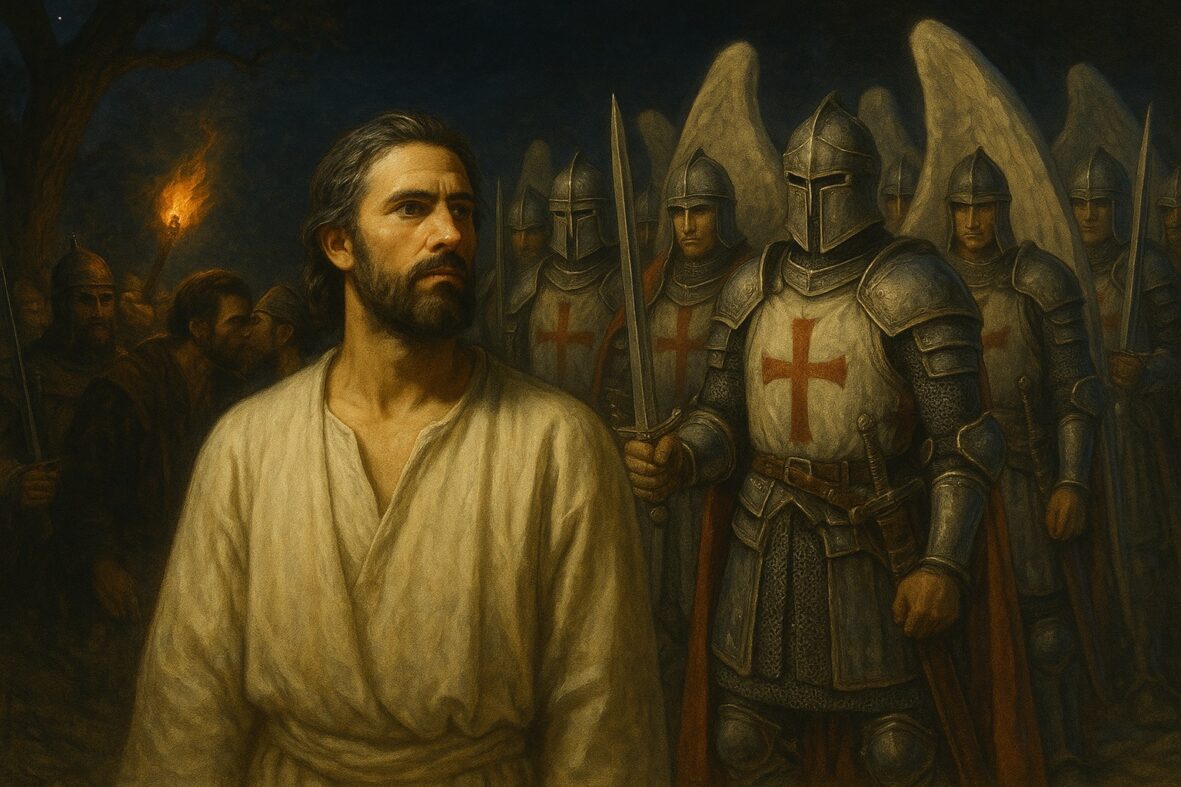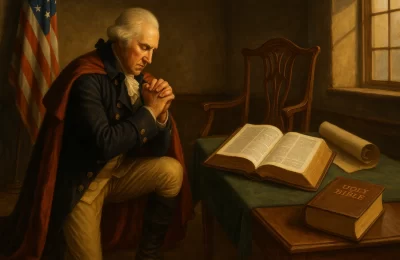Picture this: It’s the middle of the night. The olive trees whisper in the Gethsemane breeze. Soldiers with torches stomp toward the garden. Judas is at the front with that snake-like smile. And Peter? Well, Peter is doing Peter things—waving his sword around like he’s auditioning for a Roman action film.
Then, in the middle of this chaos, Jesus says something that stops the scene cold:
“Do you think that I cannot appeal to My Father, and He will provide Me at once with more than twelve legions of angels?”
Matthew 26:53
Wait—twelve legions? That’s 72,000 angels. Not sweet, chubby cherubs playing harps. We’re talking warrior-class celestial beings. The kind that, according to Isaiah 37:36, took out 185,000 Assyrians in one night. Multiply that by 72,000? You’re basically looking at enough divine firepower to wipe the Roman Empire off the map before breakfast.
And yet… nothing. No angel army. No flaming swords. Not even a heavenly stern look.
Why?
When Heaven Held Its Breath
Let’s rewind. Jesus is in Gethsemane, praying to the Father. He knows the cross is hours away. And now, betrayed by a kiss, He faces arrest. This moment is pregnant with tension. The Son of God stands with every right to call in the cavalry. The angels, no doubt, are watching from the ramparts of heaven, fists clenched, armor at the ready, ready for the word.
And Jesus… lets them stand down.
Spurgeon imagined it this way: “For a man to have force ready to his hand, and then to abstain from using it, is self-restraint of a far nobler kind.” Jesus had the keys to heaven’s armory. Instead, He chose submission.
John MacArthur puts it bluntly: If Jesus had called those angels, He would have saved Himself—and condemned us. No cross. No atonement. No resurrection. Just divine justice with no mercy.
More Than a Number: Why Twelve Legions?
Why did Jesus mention that specific number? He could’ve said “a lot of angels” or even “all the angels in heaven.” But twelve legions is precise—almost military.
Michael Heiser sees something deeper: Jesus isn’t just naming a big number. He’s revealing His identity. This is the language of a Commander-in-Chief. The Lord of Hosts. The Son of Man who rides on clouds and commands the divine council. The twelve legions may even symbolize the twelve tribes of Israel—a full covenantal army waiting at His disposal.
He had heaven on speed dial. And He didn’t press send.
The Power of Not Acting
There is a kind of power that flexes. And then there is a kind of power that restrains. Jesus chooses the second. It is the strength of a warrior who lets himself be bound. Of a King who allows His own crown to be made of thorns.
This is the kind of moment that turns the universe upside down. Because the Lion of Judah chooses to become the Lamb led to the slaughter.
Peter, of course, misses the memo. He slices off a guy’s ear. Jesus heals the man. “Put the sword away,” He says. “This must happen.”
Theologians across time have echoed this truth: Jesus was never a victim. He was never overpowered. He was in full control. As Carson notes, He wasn’t outnumbered. He wasn’t trapped. He could have summoned 72,000 angels in an instant. Instead, He walked forward into betrayal, trial, scourging, and crucifixion.
Because of love.
Because of us.
The Angels Didn’t Come So You Could
Spurgeon marveled that the angels must have wept to see their Lord arrested by mere mortals. But they obeyed. They stood back. Because they saw the Son of God doing something greater than conquest. He was securing redemption.
And here’s the irony: if Jesus had called the angels, He would have saved Himself and lost us all. But He didn’t.
He let Himself be taken.
He let the cross happen.
Because He wasn’t just saving Himself from death. He was saving us through it.
This Easter, Remember the Silence
We celebrate the Resurrection—and rightly so. But before Sunday came Friday. And before Friday came a moment under the olive trees, when the Savior of the world could have summoned an army and walked away.
But He didn’t.
The legions stayed put.
Because Jesus stayed put.
And that moment of divine restraint?
That’s the moment everything changed.
Footnotes
- D.A. Carson, Matthew (Expositor’s Bible Commentary, Vol. 9), Zondervan.
- Michael S. Heiser, The Unseen Realm, Lexham Press.
- Charles Spurgeon, Metropolitan Tabernacle Pulpit, various sermons on Gethsemane and Christ’s Passion.
- John MacArthur, The MacArthur New Testament Commentary: Matthew 24-28; Sermons on Matthew 26 at gty.org.
- Isaiah 37:36 – One angel strikes down 185,000 Assyrians in a single night.
- Matthew 26:53 – Jesus’ reference to twelve legions of angels.
- Colossians 2:15 – Christ disarming the rulers and authorities through the cross.








